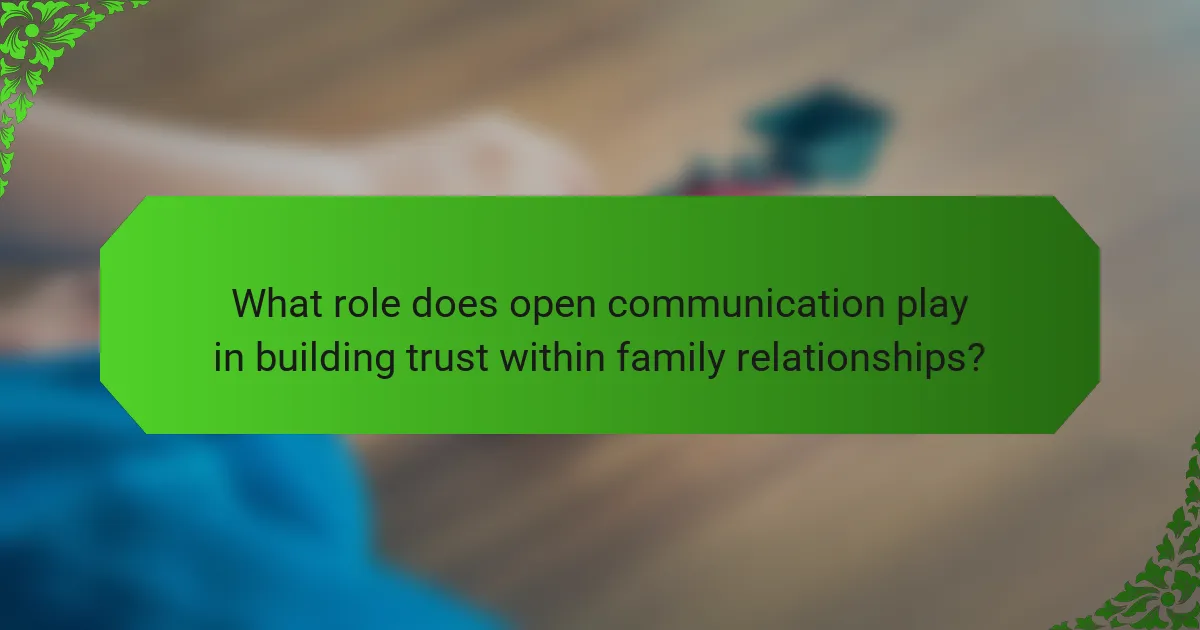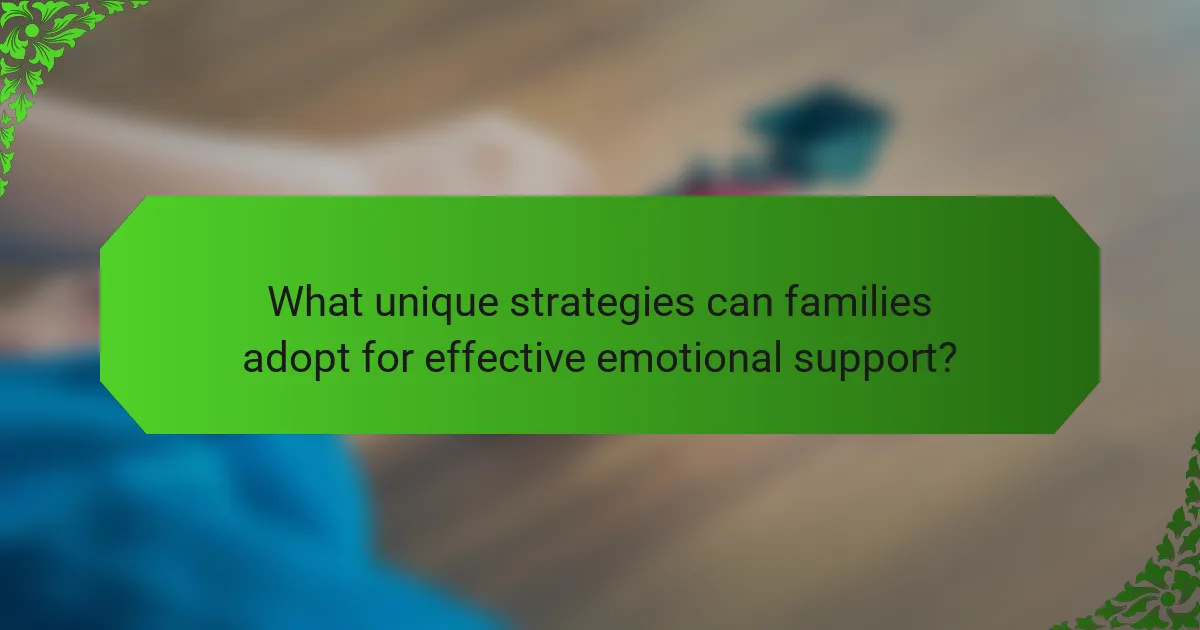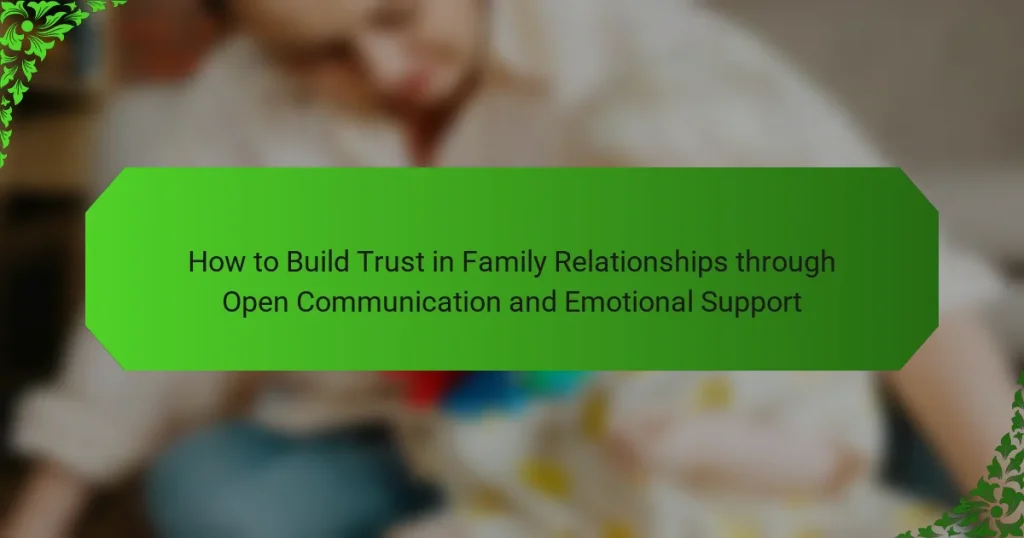Building trust in family relationships is crucial for fostering strong emotional bonds. Open communication enhances transparency and encourages emotional sharing. Emotional support through active listening and validation strengthens these connections. Implementing regular family meetings and shared activities promotes understanding and teamwork, vital for lasting trust.

What role does open communication play in building trust within family relationships?
Open communication is essential for building trust in family relationships. It fosters transparency, encourages emotional sharing, and strengthens bonds. Families that prioritise open dialogue create safe spaces for expressing feelings and resolving conflicts, leading to deeper connections. Regularly engaging in honest conversations enhances understanding and empathy, which are crucial trust-building elements. As a result, family members feel valued and supported, reinforcing their commitment to one another.
How can families establish a culture of openness and honesty?
Families can establish a culture of openness and honesty by fostering open communication and providing emotional support. Encourage regular family meetings to discuss feelings and concerns. Create a safe environment where all members feel valued and heard. Active listening is crucial; show empathy and understanding when family members share. Promote transparency by sharing personal experiences and emotions, which builds trust. Establishing routines for open dialogue strengthens relationships and encourages honesty.
What are effective communication techniques for families?
Open communication and emotional support are essential for building trust in family relationships. Effective techniques include active listening, expressing feelings openly, and encouraging honest dialogue.
Active listening involves fully concentrating on the speaker, validating their emotions, and responding thoughtfully. This fosters a safe environment where family members feel valued.
Expressing feelings openly allows family members to share their thoughts and concerns without fear of judgement. This transparency strengthens bonds and promotes understanding.
Encouraging honest dialogue means creating opportunities for discussions about difficult topics. Regular family meetings can facilitate this, allowing everyone to voice their opinions and resolve conflicts collaboratively.
How can active listening enhance family discussions?
Active listening significantly enhances family discussions by fostering understanding and empathy. It encourages open communication, allowing each family member to express thoughts and feelings without interruption. This practice builds trust, as individuals feel valued and heard. As a result, family members are more likely to engage in constructive dialogue, leading to stronger emotional support and healthier relationships. Active listening also reduces misunderstandings, making it easier to resolve conflicts effectively.
What are the barriers to open communication in families?
Barriers to open communication in families include fear of judgement, lack of time, and unresolved conflicts. These factors hinder emotional support and trust-building. Fear of judgement can prevent family members from expressing their true feelings. Lack of time often leads to superficial conversations, limiting deeper connections. Additionally, unresolved conflicts can create tension, making open dialogue challenging. Addressing these barriers is crucial for fostering a healthy family environment.
How can families overcome fear of judgement?
Families can overcome fear of judgement by fostering open communication and providing emotional support. This creates a safe environment for sharing thoughts and feelings without fear. Encouraging honest discussions helps build trust, allowing family members to express concerns and vulnerabilities. As a result, emotional bonds strengthen, reducing anxiety about judgement. Regular family meetings can facilitate this process, ensuring everyone feels heard and valued.
What strategies can be used to address misunderstandings?
To address misunderstandings, utilise active listening, clarify intentions, and encourage open dialogue. Active listening fosters empathy and shows respect for each person’s perspective. Clarifying intentions helps to eliminate assumptions and misinterpretations. Encouraging open dialogue creates a safe space for expressing thoughts and feelings, strengthening trust and emotional support in family relationships.

What types of emotional support are vital for trust-building?
Open communication and emotional support are essential for trust-building in family relationships. Vital types of emotional support include active listening, empathy, validation, encouragement, and conflict resolution. Active listening ensures family members feel heard, fostering a sense of safety. Empathy allows individuals to connect on a deeper level, reinforcing bonds. Validation acknowledges feelings, promoting acceptance. Encouragement boosts confidence, while effective conflict resolution strengthens trust by addressing issues constructively. Together, these emotional supports create a nurturing environment crucial for lasting trust.
How can families identify emotional needs of each member?
Families can identify emotional needs by fostering open communication and actively listening to each member. Regular family discussions can reveal individual feelings and concerns. Encouraging expression without judgement builds trust. Observing changes in behaviour also helps identify unspoken needs. Engaging in activities together can strengthen bonds and facilitate emotional sharing.
What are common emotional needs in family dynamics?
Common emotional needs in family dynamics include trust, respect, love, and support. Open communication fosters these needs, allowing family members to express feelings and concerns. Trust is built through consistent honesty and reliability. Emotional support involves active listening and validation of each other’s experiences. These elements create a nurturing environment essential for healthy family relationships.
What unique forms of emotional support can strengthen family bonds?
Unique forms of emotional support that strengthen family bonds include shared activities, active listening, and validation of feelings. Engaging in hobbies together fosters connection, while active listening creates a safe space for expression. Validating each other’s emotions builds trust and understanding, essential for healthy relationships.
How can shared activities foster emotional connections?
Shared activities enhance emotional connections by fostering trust and communication within family relationships. Engaging in joint experiences, such as family outings or game nights, creates shared memories that strengthen bonds. These activities encourage open dialogue, allowing family members to express feelings and support each other, which is essential for emotional intimacy. Research indicates that families who participate in regular shared activities report higher levels of satisfaction and connection. As a result, these experiences serve as a foundation for lasting trust and support in family dynamics.
What role do affirmations and encouragement play in emotional support?
Affirmations and encouragement significantly enhance emotional support by fostering trust and connection. They promote positive self-perception and resilience in family relationships. Regular affirmations can lead to increased emotional openness, allowing family members to express feelings without fear of judgement. This practice strengthens bonds and encourages a supportive environment, vital for healthy communication. Studies show that consistent encouragement can improve emotional well-being, making individuals feel valued and understood.

What universal practices can enhance trust through communication?
Open communication and emotional support significantly enhance trust in family relationships. Practicing active listening fosters understanding, while expressing feelings openly encourages vulnerability. Regular family meetings can create a safe space for sharing thoughts, reinforcing bonds. Additionally, showing empathy and validating each other’s experiences builds a strong emotional foundation.
How does regular family check-ins contribute to trust?
Regular family check-ins significantly enhance trust by fostering open communication and emotional support. These interactions create a safe space for family members to express feelings and concerns, leading to deeper understanding and connection.
When families engage in regular check-ins, they demonstrate commitment to each other’s well-being. This consistency builds reliability, a root attribute essential for trust. Families that practice this often report improved relationships and a greater sense of security among members.
Moreover, check-ins allow for the identification and resolution of conflicts before they escalate. This proactive approach not only strengthens bonds but also cultivates a unique attribute of resilience within the family unit.
Ultimately, regular check-ins contribute to a trusting environment, encouraging transparency and emotional vulnerability, which are critical for healthy family dynamics.
What are the benefits of family meetings for open dialogue?
Family meetings foster open dialogue, enhancing trust and emotional support within relationships. They provide a structured environment for discussing concerns and sharing feelings. Regular meetings can lead to improved communication skills, allowing family members to express themselves freely. This practice strengthens bonds and promotes understanding, ultimately creating a more cohesive family unit.

What unique strategies can families adopt for effective emotional support?
Families can adopt unique strategies such as active listening, regular family meetings, and emotional check-ins for effective emotional support. Active listening fosters understanding and validation, while family meetings create a safe space for sharing feelings. Emotional check-ins encourage openness and ongoing dialogue. These strategies build trust and strengthen relationships.
How can storytelling facilitate emotional sharing?
Storytelling facilitates emotional sharing by creating relatable experiences that foster empathy and connection. It allows family members to express feelings and thoughts in a safe environment, enhancing understanding and trust. Through shared narratives, individuals can articulate their emotions more clearly, leading to deeper bonds. This process not only strengthens relationships but also encourages open communication, which is vital for emotional support.
What role does empathy play in family relationships?
Empathy is crucial for building trust in family relationships as it fosters understanding and emotional support. When family members practice empathy, they can better communicate their feelings and needs. This open communication leads to stronger bonds and a supportive environment. Empathy also encourages active listening, which helps resolve conflicts and enhances emotional connections. Ultimately, nurturing empathy within the family promotes overall well-being and harmony.

What rare but impactful practices can deepen trust in families?
Open communication and emotional support are essential for building trust in families. Rare but impactful practices that can deepen this trust include regular family meetings, where each member shares feelings and experiences, fostering openness. Another practice is creating a family gratitude journal, encouraging members to express appreciation for one another, which enhances emotional bonds. Additionally, engaging in shared activities that require teamwork, like volunteering together, can strengthen trust through collaboration and shared goals. These practices not only promote understanding but also create a supportive environment that nurtures trust.
How can vulnerability be used as a tool for trust-building?
Vulnerability builds trust by fostering openness and emotional connection. Sharing fears and uncertainties encourages family members to reciprocate, creating a supportive environment. This mutual sharing strengthens bonds, as individuals feel valued and understood. Authentic communication, rooted in vulnerability, enhances emotional support, leading to deeper trust in family relationships.
What innovative approaches can families take to support one another emotionally?
Families can adopt innovative approaches such as regular family meetings, emotional check-ins, and shared activities to support one another emotionally. These strategies foster open communication and strengthen trust within relationships. Regular family meetings create a structured space for discussing feelings and concerns. Emotional check-ins encourage family members to express their emotional states, promoting empathy. Engaging in shared activities, like cooking or outdoor adventures, enhances bonding and facilitates natural conversations. These methods cultivate a supportive environment, essential for emotional well-being.

What common mistakes should families avoid in communication and support?
Families should avoid common mistakes like poor listening, assumptions, lack of empathy, and inconsistent support. Effective communication requires active listening and validating feelings. Avoiding assumptions allows for clearer understanding. Demonstrating empathy strengthens emotional bonds. Consistent support reinforces trust and reliability in relationships.
How can families ensure they are not dismissive of feelings?
Families can ensure they are not dismissive of feelings by actively listening and validating each member’s emotions. Establish regular family discussions where everyone shares their thoughts without interruption. Encourage open expression of feelings, reinforcing that all emotions are valid. Use empathetic responses to show understanding and support. Create a safe environment where vulnerability is welcomed, fostering deeper connections. As a result, family members feel valued, enhancing trust and emotional support within the family unit.
What are the pitfalls of assuming understanding without clarification?
Assuming understanding without clarification can lead to misunderstandings and eroded trust in family relationships. Miscommunication often results in unmet expectations and emotional distance. Clarifying intentions fosters open communication, which is essential for emotional support. This approach strengthens bonds and enhances mutual respect within the family.

What actionable tips can families implement for stronger trust and communication?
To build stronger trust and communication in families, implement regular family meetings. Encourage open dialogue by creating a safe space for sharing feelings. Practice active listening to validate each other’s perspectives. Establish family rituals to foster connection and routine. Engage in shared activities that promote teamwork and understanding.
How can families create a safe space for open dialogue?
Families can create a safe space for open dialogue by fostering trust and emotional support. Establish regular family meetings to encourage sharing feelings and thoughts. Create an atmosphere of respect where everyone feels valued. Use active listening techniques to demonstrate understanding. Encourage vulnerability by sharing personal experiences. Set clear boundaries to ensure privacy and comfort. Recognise and validate each family member’s emotions to strengthen connections.
What daily practices can reinforce emotional support among family members?
Daily practices that reinforce emotional support among family members include open discussions, active listening, and expressing appreciation. Engaging in regular family meetings fosters a safe space for sharing feelings and concerns. Active listening, where family members validate each other’s emotions, strengthens trust. Expressing appreciation through small gestures or verbal affirmations enhances emotional connections. These practices cultivate an environment of understanding and support, essential for healthy family relationships.



